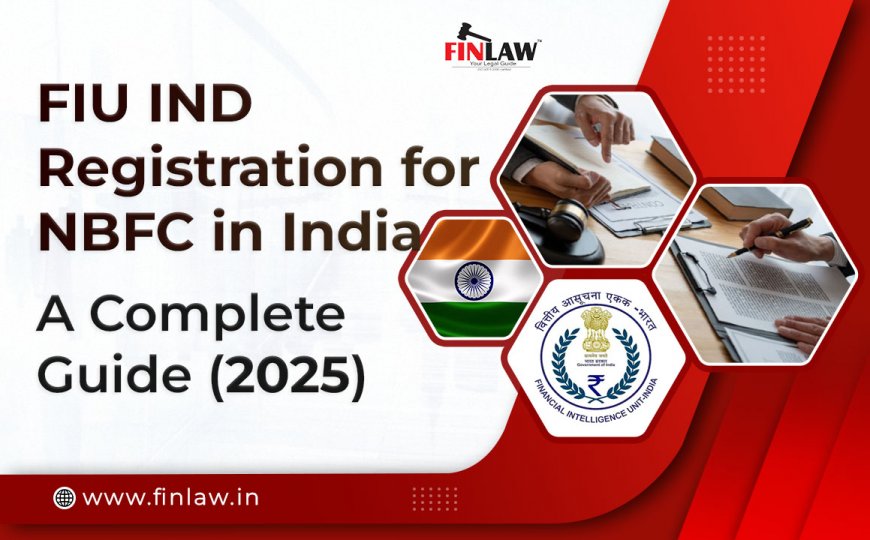FIU IND Registration for NBFC in India: A Complete Guide (2025)
Detailed 2025 guide on FIU IND registration for NBFCs in India. Learn the process, documents, compliance, FINnet portal steps & penalties for non-registration.

Introduction
Non-Banking Financial Companies (NBFCs) have become the backbone of India’s financial sector by catering to segments often underserved by traditional banks. From micro-lending and asset financing to consumer loans and digital credit platforms, NBFCs play a vital role in financial inclusion.
But with this role comes responsibility. Because NBFCs deal with high-value and high-volume financial transactions, they are vulnerable to misuse for money laundering (ML) and terrorist financing (TF) activities. To prevent such misuse, the Prevention of Money Laundering Act (PMLA), 2002 mandates NBFCs to register with the Financial Intelligence Unit – India (FIU-IND).
This guide will cover everything you need to know about FIU IND registration for NBFC in India in 2025—its importance, eligibility, step-by-step process, documents, compliance obligations, penalties, and best practices.
What is FIU-IND?
The Financial Intelligence Unit – India (FIU-IND) is the national agency established by the Government of India under the Ministry of Finance. It acts as the central hub for receiving, processing, analyzing, and disseminating financial intelligence.
Key responsibilities of FIU-IND include:
-
Collecting information on suspicious financial transactions from reporting entities.
-
Enforcing PMLA compliance by NBFCs, banks, intermediaries, and other financial institutions.
-
Coordinating with domestic regulators like RBI, SEBI, and IRDAI.
-
Sharing intelligence with international bodies such as Egmont Group to combat cross-border money laundering.
Why FIU-IND Registration is Mandatory for NBFCs
FIU IND registration for NBFC is not merely a formality. It is a statutory requirement under Section 12 of PMLA.
Key reasons why NBFCs must register:
-
Legal Compliance: Without registration, NBFCs cannot be recognized as Reporting Entities under PMLA.
-
Regulatory Expectations: RBI mandates NBFCs to comply with AML/CFT guidelines in line with FIU reporting.
-
Risk Mitigation: Protects NBFCs from being unknowingly used for money laundering or terrorist financing.
-
Transparency: Builds trust with investors, customers, and regulators.
-
Avoiding Penalties: Non-compliance can result in hefty fines, restrictions, and prosecution.
Applicability: Which NBFCs Must Register?
FIU IND registration for NBFC applies to:
-
Deposit-taking NBFCs (NBFC-D).
-
Non-deposit-taking NBFCs (NBFC-ND) above a certain asset size threshold.
-
NBFCs engaged in:
-
Microfinance
-
Leasing and Hire Purchase
-
Loan and Credit Services
-
Infrastructure Finance
-
Mortgage Guarantees
-
Housing Finance (regulated separately but covered under PMLA)
-
Digital Lending NBFCs and Fintech NBFCs offering online loans or wallets.
If an NBFC is licensed by RBI, it should assume it falls under the reporting ambit of FIU-IND.
FINnet / FINGate Portal: The Registration Interface
FIU-IND uses the FINnet (Financial Intelligence Network) and its upgraded system FINGate 2.0 for registration and reporting.
Through this portal, NBFCs can:
-
Submit applications for registration.
-
Upload KYC and organizational documents.
-
Appoint and update details of Principal Officer and Designated Director.
-
File Cash Transaction Reports (CTR), Suspicious Transaction Reports (STR), and other prescribed reports electronically.
-
Access utilities to validate reporting formats.
Step-by-Step FIU IND Registration Process for NBFC (2025)
Step 1: Internal Readiness
-
Draft an Anti-Money Laundering (AML) and Counter-Terrorism Financing (CFT) Policy.
-
Create internal procedures for customer due diligence (CDD), risk categorization, and record-keeping.
-
Pass a Board Resolution appointing a Principal Officer (PO) and a Designated Director.
Step 2: Gather Required Documents
(See detailed checklist below).
Step 3: Register on FINnet/FINGate Portal
-
Visit FIU-IND’s FINGate 2.0 portal.
-
Select “Register Reporting Entity.”
-
Fill in NBFC details (CIN, PAN, type of NBFC, registered office, etc.).
-
Upload all required documents in PDF format.
Step 4: Principal Officer & Designated Director Details
-
Provide PO’s KYC details and professional credentials.
-
Submit declaration forms and authorization letters.
Step 5: FIU Verification
-
FIU-IND may seek clarifications or additional documents.
-
In some cases, FIU conducts in-person verification for new applicants.
Step 6: Approval & Reporting Code
-
Once approved, FIU-IND issues a Reporting Entity Code (RE Code).
-
The NBFC is now authorized (and obligated) to file CTRs, STRs, and other reports.
Documents Required for FIU IND Registration for NBFC
Here is a comprehensive document checklist:
Company Documents
-
Certificate of Incorporation (CIN).
-
Memorandum & Articles of Association.
-
Permanent Account Number (PAN).
-
GST Registration Certificate.
-
RBI registration certificate as NBFC.
Financial Documents
-
Audited balance sheets and P&L statements for the last 3 years.
-
Latest Income Tax Returns.
Board Approvals
-
Board resolution appointing Principal Officer and Designated Director.
-
Authorization for FIU-IND registration.
Principal Officer & Director Documents
-
PAN, Aadhaar, and proof of address.
-
Passport-size photographs.
-
Resume/qualification proof (AML knowledge preferred).
-
Signed declaration form.
Ownership & Beneficial Ownership
-
Details of promoters, directors, and ultimate beneficial owners (UBOs).
-
KYC of promoters/shareholders holding significant control.
Compliance Framework
-
AML/CFT policy.
-
Transaction monitoring process documents.
-
Escalation framework for suspicious activities.
Post-Registration Compliance Obligations
After FIU IND registration, NBFCs must adhere to continuous compliance requirements:
-
Cash Transaction Reports (CTR): For cash deposits or withdrawals of ₹10 lakh or more.
-
Suspicious Transaction Reports (STR): For transactions inconsistent with customer profile or unusual in nature.
-
Non-Profit Organization Transaction Reports (NTR): For dealings with NGOs/NPOs above prescribed limits.
-
Record Retention: Maintain KYC and transaction records for at least 10 years.
-
Training: Provide AML/CFT training to employees annually.
-
Regular Updates: Update PO/Director details with FIU when changes occur.
Penalties for Non-Compliance
NBFCs failing to register or comply with FIU obligations may face:
-
Monetary Penalties: Heavy fines under PMLA.
-
Operational Restrictions: RBI and FIU may restrict business operations.
-
Prosecution: Senior management can be held personally liable.
-
Reputational Damage: Loss of customer and investor trust.
Best Practices for Smooth FIU IND Registration for NBFC
-
Appoint an experienced Principal Officer with AML/CFT knowledge.
-
Conduct internal audits of KYC and transaction monitoring systems.
-
Validate reports with FIU utilities before submission to avoid rejection.
-
Engage compliance consultants for complex cases or first-time registration.
-
Maintain an FIU compliance tracker to monitor filing deadlines and status.
Frequently Asked Questions (FAQs)
Q1. What is the cost of FIU IND registration for NBFC?
There is no registration fee. However, NBFCs may incur compliance and consultancy costs.
Q2. Can a newly incorporated NBFC apply immediately?
Yes. FIU-IND registration should be applied for soon after receiving an RBI license.
Q3. Is online submission mandatory?
Yes, all applications and reports must be filed electronically through the FINnet/FINGate portal.
Q4. Who is the Principal Officer (PO)?
A senior management employee responsible for AML compliance, filing reports, and acting as the contact person with FIU-IND.
Q5. Can non-compliance affect RBI registration?
Yes. Repeated violations of FIU reporting obligations can attract RBI scrutiny and action.
Sample Compliance Calendar for NBFCs
|
Compliance Task |
Frequency |
Responsible Officer |
|
CTR Filing |
Monthly |
Principal Officer |
|
STR Filing |
As soon as suspicious activity is detected |
Principal Officer |
|
Employee AML Training |
Annual |
Compliance Team |
|
Review of AML Policy |
Annual |
Board/Compliance Officer |
|
Record Retention |
10 years |
Compliance Team |
Conclusion
FIU IND registration for NBFC in India is a legal necessity and a cornerstone of regulatory compliance. It strengthens the financial system against money laundering and terrorist financing risks while safeguarding the NBFC’s reputation and operational credibility.
NBFCs should treat FIU registration as a strategic compliance priority. With proper documentation, strong internal policies, and proactive reporting, NBFCs can ensure smooth registration and ongoing compliance.
In 2025, as regulators tighten monitoring and digital transactions grow rapidly, timely FIU IND registration and robust AML compliance are more important than ever.
What's Your Reaction?



















